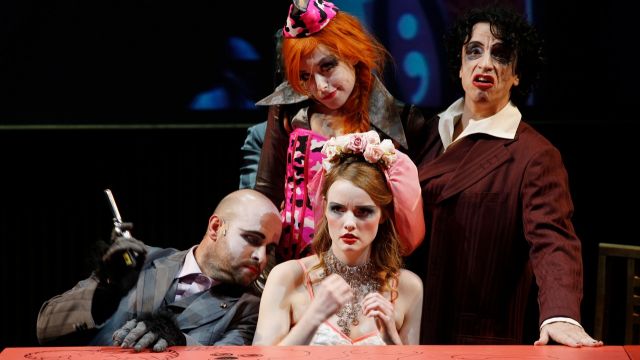The Threepenny Opera
Since the inspiring launch of Michael Kantor’s final season as Artistic Director at Malthouse, tickets for The Threepenny Opera completely sold out. The anticipation for this co-production has been palpable. I was so, so lucky to get seats – albeit in ‘the gods’ above the orchestra and almost above the action, where I got to watch the lid of this metaphorical pressure cooker fly off.
The ‘show’ opens with Jenny, played by Paul Capsis, seemingly tossed on stage to be violated or ravaged. He/she pulls herself together, as only the flamboyant Capsis can, and sings Mack the Knife. The music is well known. The lyrics are unexpected with their local references. The casting is exciting.
It takes a while ‘go with the flow’ of this is appropriately bold, brash, loud production. We are well into the first act before the audience applauds the musical numbers. They could be registering astonishment or bewilderment.
Although brazen, uncompromising and outrageous, at times there is sensibility of repression about most of the performances. This may be due to the tempo being set by the music, or to performers having not yet ‘hit their straps’. The use of Brechtian staging that frames and signals, the working in and around a centralised set and/or the poise of the operatic singers all add to the sense of constraint.
A gangster ‘Underbelly’ milieu is more fully realised through the introduction of the Peachum family and references to Smith Street and other Melbourne locations. As characters central to the story and stalwarts of the staging, Judi Connelli as Mrs Peachum, Grant Smith as Mr Peachum, and Anna O’Byrne as Polly Peachum are all delightfully strong physically and vocally. It is Eddie Perfect who embodies fluidity in his characterisation of the murdering ne’er do well Macheath. He very successfully portrays the ruthless lustful (yet irresistible to women) rogue, from whom it would appear, no one is safe. It is evident, however, that Perfect is working very hard.
With Raymond Cortese’s text, Peter Corringan’s set and Michael Kantor’s direction, the whole has a showy cross-gender feel that is reminiscent of Chapel Street in the 1980’s.
To contemporise a classic does not guarantee a perfect fit and can require a more conscious suspension of disbelief from the audience. In this instance a Coronation seems incongruous with gangster life in Melbourne and makes little sense, as it is a relic from the original setting in Dickensian London. However, as with other Kantor productions, it is the inconsistencies, the jarring moments, the odd-fits that allow for thought and interpretation. His use of incongruities and ambiguities can be startling. Those who are not used to Kantor’s eclectic style may find this production to be an unsettling curiosity.
For me this much-anticipated offering didn’t disappoint, but didn’t thrill either, except for the indulgent, pre interval rendition of Mack the Knife. However if there is a return season it will certainly be worthwhile catching this vibrant moment in Australian theatre history.
Suzanne Sandow
Photo Credit: Jeff Busby
Subscribe to our E-Newsletter, buy our latest print edition or find a Performing Arts book at Book Nook.

